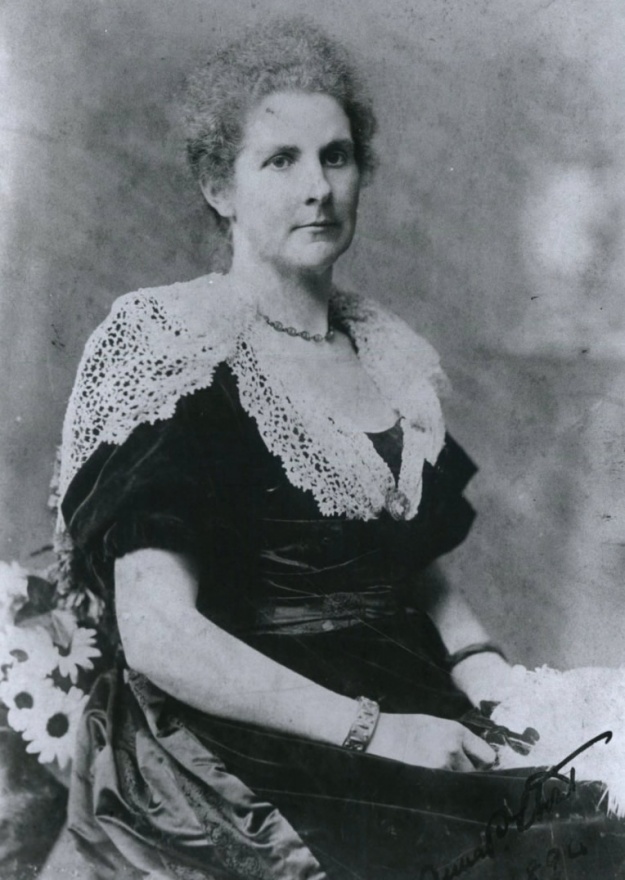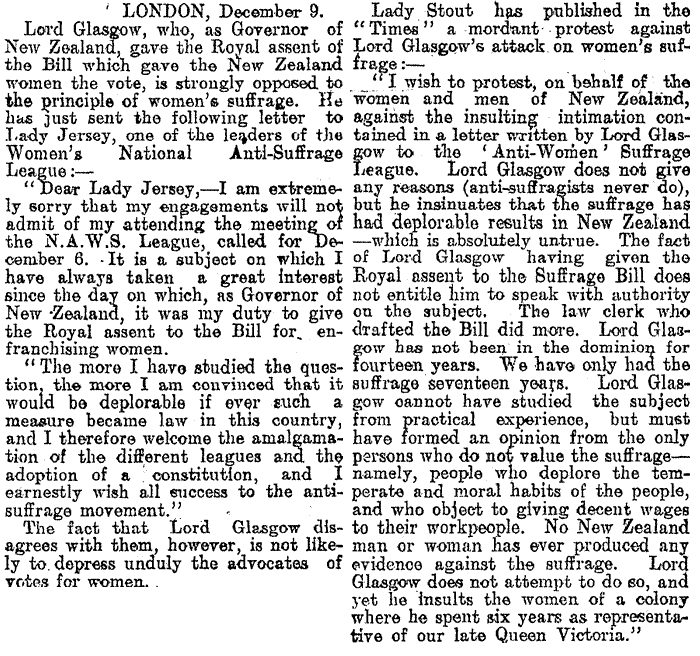
Anna Stout (1858–1931).
Anna Stout worked tirelessly in New Zealand and Britain for women’s rights. She strongly believed in women’s equality and the power of education, particularly for Māori women. She supported many volunteer organisations, both in her native Dunedin and later in Wellington when she and the children joined her husband, the politician Robert Stout, there.
In 1885 Anna was a founding member of the New Zealand branch of the Women’s Christian Temperance Union (WCTU). An American organisation, the WCTU spread a message of temperance, morality and women’s suffrage around the world. Women ran the organisation themselves, unlike most contemporary institutions.
One of the reasons why the WCTU wanted to reduce alcohol consumption was because it often led to the physical abuse of women and children. Compounded by a lack of financial independence and discriminatory divorce laws, life could be extremely difficult with no escape for women who had drunken abusive husbands. Understandably women who supported temperance were motivated by the opportunity to have a say on referendums on the issue of prohibition.
Throughout the WCTU’s campaign for suffrage and the foundation of the National Council of Women (NCW) in 1896, Anna worked closely with Kate Sheppard. In 1897, however, she split from the NCW (and Kate) because of its overtly political nature. She continued her work supporting women, but when Robert was appointed Chief Justice in 1899, she had to take a step back. As the wife of the head of the New Zealand judiciary, she couldn’t speak out on political or social matters.
In 1909, Anna, Robert and their daughter moved to England, joining two sons studying there. The British ‘Votes for Women’ campaign was in full swing and Anna immersed herself in the movement. She used her experience of the benefits of women having the vote to counter the arguments of anti-suffrage campaigners.

Letter published in the Auckland Star, 28 December 1910, p. 9
Of particular note was her letter in response to Lord Glasgow in 1910. Although Glasgow, as governor of New Zealand, had signed the Electoral Act 1893 into law, he spoke out against women’s suffrage for Britain, labelling it deplorable. In a letter to the Times, Anna observed that as Glasgow had only been in New Zealand for the first three years of women’s suffrage, he could not speak with any authority on its effects.
In another letter, Anna dispelled eight misconceptions about the impact of women’s suffrage, such as that women would adopt masculine habits or neglect their homes and children. She countered each point with first-hand evidence, statistics and a dash of humour. Against the argument that female suffrage would cause marital strife, she quipped that ‘people who never quarrel are not likely to quarrel over political questions, and … perhaps their brains … might be improved by a difference in opinion once in three years’. [1]
While Anna’s presence in London took the New Zealand story to Britain, it also brought the suffragette story to New Zealand, where newspapers reported on her movements and published her letters.
Anna returned to New Zealand in 1912 as a woman of social standing and influence. She continued to participate in public debates over the role of women. She opposed advocates of domestic training as the highest priority for the education of girls, and famously supported the rights of prostitutes.
[1] Anna P. Stout, ‘Votes for Women’, Times, 19 November 1909, p. 10.
Further reading
Barbara Brookes, A history of New Zealand women, Bridget Williams Books, Wellington, 2016
Sandra Coney, Standing in the sunshine: a history of New Zealand women since they won the vote, Penguin Books (NZ), Auckland, 1993
Raewyn Dalziel. 'Stout, Anna Paterson', Dictionary of New Zealand Biography, first published in 1993. Te Ara - the Encyclopedia of New Zealand, https://teara.govt.nz/en/biographies/2s47/stout-anna-paterson
Roberta Nicholls, ‘Anna Stout’, in Charlotte Macdonald, Merimeri Penfold and Bridget Williams (eds), The book of New Zealand women: ko kui ma te kaupapa, Bridget Williams Books, 1991, pp. 632-6


Community contributions